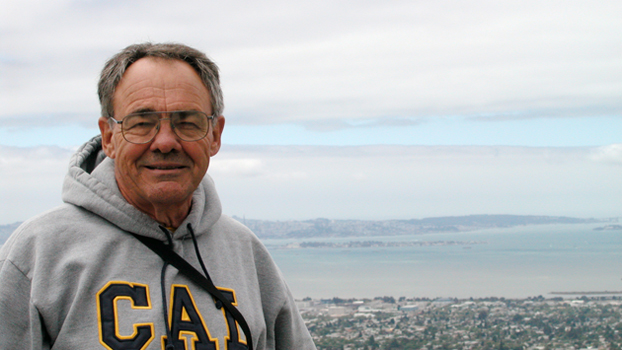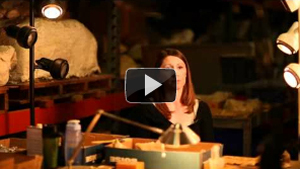 Caption: Jere H. Lipps has joined Cal State Fullerton as director of the Cooper Center. Download Photo
Caption: Jere H. Lipps has joined Cal State Fullerton as director of the Cooper Center. Download Photo
University Initiative: Bringing the Past to Life
Cooper Center Director Appointed
Scientist to Lead Archeological, Paleontological Curation and Research
Jan. 11, 2012 :: No. 70
Jere H. Lipps is the newly named director of Orange County's John D. Cooper Center for Archaeological and Paleontological Curation and Research, a partnership between the county and Cal State Fullerton. His appointment by Angela Della Volpe, dean of the College of Humanities and Social Sciences, and Robert Koch, acting dean of the College of Natural Sciences and Mathematics, was effective Jan. 9.
Lipps comes from UC Berkeley, where he served as professor of paleontology and integrative biology for the past 22 years. During his tenure at Berkeley, he also was chair of the Department of Integrative Biology, director and curator of the Museum of Paleontology, and chair of the Berkeley Natural History Museums.
Born in Los Angeles and educated at UCLA in geology, paleontology and zoology, Lipps said he is pleased about returning to Southern California.
"I am very excited to take this position," Lipps said. "The Cooper Center itself has fantastic potential for solving many problems in paleontology. All of the marine mammal fossils in the collection are tremendous additions to knowledge and heritage of Orange County and the Pacific Rim and will help fill in critical gaps in current knowledge. Some of the fossils are as old as the oldest rocks that make up Orange County," he noted. "We will use what we can to inform residents of the county, state and nation about our discoveries."
As director of the Cooper Center, Lipps will oversee the management and curation of the collection and play a critical role in securing grants to support scientists from around the world to study it, said Koch, acting dean of the College of Natural Sciences and Mathematics.
Lipps "will be the face of the center to both the scientific and local communities and will oversee the development of the collection for both scientific study and public display," Koch added.
"We are very excited about working with Dr. Lipps," said Della Volpe, dean of the College of Humanities and Social Sciences. "We expect he will help us develop the center into a world-class operation and local focus of interest."
Lipps "brings an incredibly rich and deep level of expertise to the Cooper Center," said David Bowman, professor and chair of the university's Department of Geological Science. "It's no exaggeration when I say he is a world-class scientist and one of the most pre-eminent scientists in paleontology in the United States. I think it also speaks to the importance of the Cooper Center collection that a scientist of Dr. Lipps' stature would be attracted to this position."
Lipps' particular field of interest is the ecology and paleobiology of marine microorganisms, animals and marine mammals. Throughout the course of more than 30 years, he conducted field research in Antarctica, French Polynesia, Papua New Guinea, New Zealand, Australia, the Galapagos Islands and North America's west coast, including detailed studies in Orange County. Along the way, he has had close encounters with live sharks, Leopard seals, snakes, bats and kangaroos, as well as rats, spiders and a variety of other beasts.
He has written more than 400 research articles and is an authority on Charles Darwin's voyage on the Beagle in 1831-36, having walked in Darwin's footprints in many of the places he's visited.
Lipps has been accorded many honors, including the naming of Lipps Island in his honor in Antarctica, as well as such awards as: the Antarctic Medal of the U.S., Joseph A. Cushman Award for Excellence in Research on Foraminifera, Raymond C. Moore Medal of SEPM for Sustained Excellence in Paleontology, Darwin Award of National Center for Science Education, and W. Storrs Cole Award of the Geological Society of America.
He also is a fellow of the American Association for the Advancement of Science, the California Academy of Sciences and Geological Society of America, as well as a Centennial Fellow of the Paleontological Society. Lipps has served as president of the Paleontological Society, the Association of North American Paleontological Societies and the Cushman Foundation, and as an officer for other societies.
At the Cooper Center, Lipps will oversee the development of the collections and facilities as a curation and research facility for archaeological and paleontological materials collected throughout Orange County. CSUF faculty members and students will perform much of this work. The facility welcomes visits and studies of its material by students and experts from other institutions around the globe.
The center marked its official opening last year, and John H. Foster, emeritus professor of geological sciences, served as its interim director while the university searched for a permanent director.
Koch headed the seven-member search committee that recommended Lipps for the position.
Media Contacts:
Valerie Orleans, Public Affairs, 657-278-4540 or vorleans@fullerton.edu
Debra Cano Ramos, Public Affairs, 657-278-4027 or dcanoramos@fullerton.edu
Mimi Ko Cruz, Public Affairs, 657-278-7586 or mkocruz@fullerton.edu

